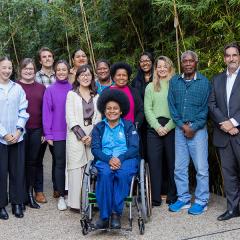About
The Pacific Region Advisory Council (PAC) plays a pivotal role in ensuring the success and sustainability of the Safe Sport Hub initiative. It will provide strategic advice and critical analysis to pressure-test the study’s methodology, assumptions, and findings. This 'sober second thought' approach will serve as a quality assurance mechanism, ensuring that the evidence base remains robust and credible without undermining its foundations.
Critical Friend Role
The PAC will act as a constructive, independent voice in the project, offering critical feedback and alternative perspectives. This role ensures the rigor and relevance of the findings while fostering an environment of collaboration and shared accountability.
Credibility and Diversity
Comprising representatives with diverse identities, experiences, and expertise across countries and languages, the PAC enhances the study’s credibility. This diversity ensures the inclusion of varied viewpoints and local knowledge, creating a more robust and inclusive framework for safeguarding in sport.
Network Access and Engagement
PAC members bring unparalleled access to regional and local networks, fostering connections with key stakeholders, including athletes, policymakers, and community leaders. This networked approach enhances stakeholder engagement, ensuring that the project is community-led and rooted in Pacific realities.
Responsibilities
The Pacific Region Advisory Council (PAC) will provide strategic guidance throughout the feasibility study. Its core responsibilities include:
- Reviewing methodologies, assumptions, and findings to ensure rigor and credibility.
- Offering recommendations for stakeholder engagement, governance frameworks, and operational strategies.
- Acting as a critical friend to challenge and refine the project approach while safeguarding the evidence base.
Guiding principles
The principles below serve as a foundation for the PAC’s operations and interactions, ensuring alignment with the Safe Sport Hub’s mission and the unique needs of the region.
- Cultural Sensitivity and Respect
- Acknowledge and respect the diverse cultural, linguistic, and social contexts of Pacific communities.
- Promote culturally grounded approaches to safeguarding that reflect local traditions, values, and ways of life.
- Advocate for equitable representation of all genders, abilities, and cultural backgrounds in the PAC and project activities.
- Community-Led Collaboration
- Prioritise engagement across the Pacific region by leveraging local knowledge and relationships of council members.
- Ensure co-design of initiatives with input from local communities, sports organisations, and athletes.
- Build on the Pacific’s shared strengths, including its strong sense of community and passion for sport.
- Survivor-Centred Focus
- Prioritise the safety, well-being and rights of those affected by abuse in the context of sport, aligning with the Do No Harm approach.
- Promote the agency of survivors through meaningful engagement with athletes with lived experience of abuse in sport.
- Emphasise trauma-informed practices in all actions and recommendations.
- Transparency and Accountability
- Regularly report on progress and decisions to the IOC Pacific Safe Sport Hub team.
- Ensure accountability to local communities through regular communication about the organisational structure and activities of the council.
- Sustainability and Capacity Building
- Focus on building long-term capacity within Pacific communities to manage and sustain the Safe Sport Hub.
- Promote strategies that empower local organisations and leaders to take ownership of safeguarding initiatives.
- Collaboration Across Sectors
- Encourage partnerships between sporting and non-sporting organisations, government agencies, and NGOs to create a holistic safeguarding ecosystem.
- Leverage existing regional networks to maximise impact and resource efficiency.
- Evidence-Based Decision-Making
- Council members share knowledge and experiences to inform recommendations and decision-making processes.
- Engage with relevant external data and evidence provided to the council to inform recommendations and decision-making processes.
- Commitment to Innovation
- Foster creative and adaptive approaches to overcoming challenges unique to the Pacific region, including relevant digital technologies.
- Theoretical Grounding
- Employ relevant theoretical frameworks to inform PAC recommendations, included but not limited to, public health approaches, human rights, and trauma informed care.











